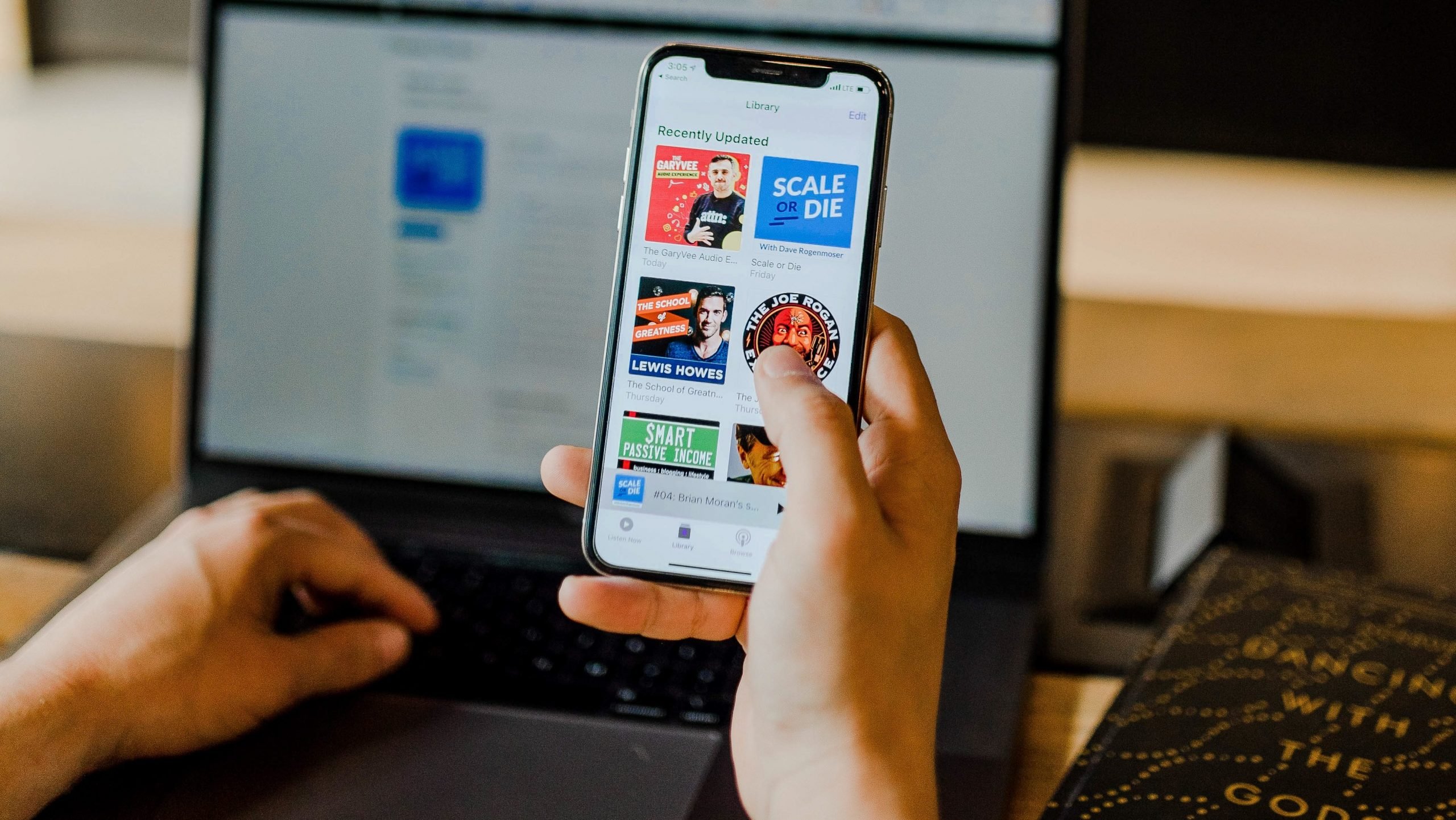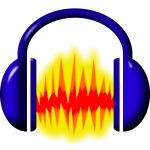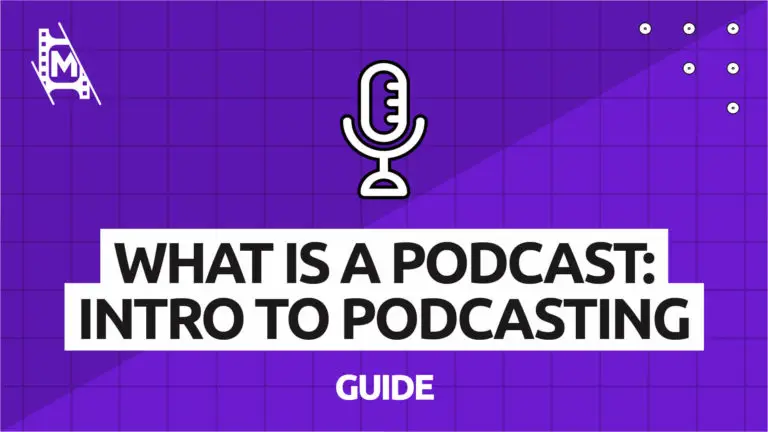The ability to personalize what you listen to is a convenience that has only become available in recent years. Listening to the radio used to be the go-to audio distraction for car rides or quiet times, but now you can find personalized podcasts on just about any topic.
It can be a bit intimidating trying to figure out where to listen to podcasts and what kind you may be interested in if you’re new to the concept. In this article, we will cover everything you need to know about podcasts, how to find ones that interest you, and even help you start one of your own.
If you are looking to start a podcast, check out some of our other articles as well:
Definition of a Podcast
What a podcast – or audio program – entails depends heavily on the people or company producing it, but as a whole, they tend to follow a few basic factors.
On-Demand
A podcast isn’t something you have to worry about missing if you take a week or two off of listening. You’re able to access podcasts anywhere and anytime that you want, so you’ll never have to worry about missing out.
Your smartphone is the typical device you’ll use to listen to a podcast. Using data or being connected to wifi gets the job done, but most apps or websites that offer podcasts also give you the option to download podcasts so that you can enjoy them even when completely offline.
Niche Subjects
Podcasts are easy to make and publish, making them one of the most versatile options for entertainment available. People make podcasts about any subject you can think of, so it’s effortless to search for the topics that truly interest you.
Series of Episodes
A standalone podcast episode is almost non-existent. Creators tend to make podcasts into a series of episodes so that listeners can keep coming back for new content. How they choose to break up these episodes is up to them, but most keep them in a cohesive order.

What Exactly Is a Podcast?
The factors above are all common defining traits of a podcast, but they still don’t quite cover what a podcast really is.
Creators
There are almost no prerequisites to start a podcast, so anyone with a device that can record their voices can make one in an afternoon. This makes an ideal way for people to share their interests or an important message with other like-minded individuals.
To a creator, a podcast is a perfect way to express themselves and build up a community that they can connect with over a shared interest or worldview. The internet is full of ways to bring people separated by distance together, and podcasts are one of the top methods.
Listeners
Normal radio and talk show programs may dip into your personal interests, but they rarely stay on the same subject for long. Individual podcasts are much more likely to focus on a single subject, so finding ones that involve your particular interests is a simple task.
Most creators also link their listeners to other mediums where you can chat and discuss the subject with other interested listeners. Hopping into these communities is an easy way to find people who enjoy the same things that you do.
History of Podcasting
Podcasting may seem like a recent trend, but it can trace its origin back to the early 2000s. It quickly gained traction and became one of the top entertainment mediums of the present.
Interest in Podcasting – Google TrendsThe Prologue
One big factor of a podcast is that you can take it on the go. Mobile listening was confined to the car radio until Apple debuted their new device in 2001, known as the iPod. This ability to listen to music on the go led to new ideas for the future of audio entertainment.
The Birth
Adam Curry and Dave Winer were the first to come together in 2004 and try to figure out a way to download radio broadcasts onto the iPod so that they could listen to them on the go. They each created software that could work together to extract audio files and transfer them to the iPod.
A journalist named Ben Hammersley was the next to help with the rise of podcasts. He wrote an article shortly after Curry and Winer began downloading audio files to their iPods that, among other things, ended up coining the word ‘podcast’ as a mix between iPod and broadcast.
The Rise
Podcasts grew in popularity after Hammersley’s article, but the two years that cemented podcasts as a popular entertainment medium were 2005 and 2014.
2005
2005 was the year that the potential for podcasts was finally becoming public knowledge. There were several milestones that occurred during the year that even led the New Oxford American Dictionary to make the word ‘podcast’ the Word of the Year.
Large companies began taking advantage of the growing trend. Yahoo created a podcast search site so people could search for ones that suited them. Apple officially introduced podcasts to iTunes and created a directory so they could begin profiting from the popularity.
2005 was also kind to new creators. The very first DIY guide to podcasting was published to help everyday people start successful podcasts. Podcasts were also shown to be quite lucrative, as one titled Mommycast signed for a six-figure deal with Dixie Consumer Products.
2014
By this point, podcasts had developed a comfortable fan base and solidified their position as a respected entertainment medium. Plus, there was a single factor in 2014 that changed the popularity of podcasts.
Serial is an investigative journalism podcast hosted by Sarah Koenig, where she tackled a closed case of a murder in 1999. Through a mixture of unique podcast formats and the dynamic Koenig was able to build in her interviews, the show blew up in popularity.
The success of Serial caught more than a few people’s attention. The number of users more than doubled in the 5 years following Serial, dwarfing the growth shown in the first decade of podcasts.
The Present
The current king of podcasts goes to Spotify. This company pulled a number of acquisitions that now make it the hub for the most popular podcasts.
Podcasts have continued to grow steadily in the number of average listeners, with a large spike in listeners thanks to Covid-19. The pandemic has given the American people more free time than they know what to do with, and many are turning to podcasts to take up that time.
Individual creators spreading their message is still a big part of podcasts, but as the popularity increases, more and more companies are trying to carve out their own lucrative pieces of the industry.
Top Podcasting Statistics
It’s easy to simply say that podcasts have grown in popularity, but seeing the numbers is far more convincing.
- Awareness of podcasting went from 22% of adults in the US in 2006 to a whopping 75% in 2020. Most of the rise in popularity came from the time after the big years of 2005 and 2014.
- As of January 2021, there are over 1,750,000 podcasts available, with more than 43 million episodes.
- Americans who had actually listened to a podcast went from 40% in 2017 to 55% in 2020.
How to Start a Podcast of Your Own
Before you begin the creation of your own podcast, just keep in mind that the overall process is easy and stress-free. A big factor of podcasts is that anyone can make one, and that hasn’t changed in the decade and a half that they’ve been around.
Nail Your Concept
You should decide on what your concept should be by thinking about what your podcast will be about and why you’re making it.
You’ll be able to pin down the theme of the podcast once you know why you’re making it. Is your message important to you? Do you want to have fun? Are you trying to represent a company? The theme will be a core feature of your podcast, so don’t stray from it once you pick it.
Now you need to tackle the ‘what’ of your podcast. You want to pick a topic that you’re passionate about and can really dive into with your listeners. Your topic should also be broad enough that you won’t exhaust the discussion in just an episode or two.
Picking a name for your podcast may feel like the hardest part of the entire process. The name should mean something to you, but it also has to be catchy and memorable if you want strangers to check it out. Adding keywords to increase potential searches is a common title tactic.
Pick a Format
Deciding how to layout your podcast is going to come down to what you’re comfortable with and finding something that fits your theme.
If you plan on running your podcast by yourself, you’ll do a bit better if you come up with a loose outline of your episodes to avoid rambling and keep you on track. Keep in mind that doing your recordings alone eliminates any opportunity at banter or someone else’s opinions.
If you plan on running your podcast with others, you’ll have to decide if you want the other person to be a co-host or just a guest. This option works if you’re doing an interview-style podcast or if you want the audio to be more of a conversation instead of just you talking.
Your episodes don’t have to all be the same length of time, but consistency helps to build up a solid fan base. You should only go as long as you need to and don’t feel the need to fluff up your time. Some successful podcasts have ten-minute episodes, while others are hours long.
You also need to decide on some kind of scheduled release for your episodes. It doesn’t have to be a daily thing, but even sticking to a weekly broadcast can let your listeners know when to expect new content. A schedule will also keep you from quitting if your interest begins to dwindle.
If you still have trouble picking a format, read more about podcasts formats in our other article.
Record, Edit, and Publish Your First Episode
Don’t be afraid of initial failure or missteps. It takes time to find your footing and figure out any changes that you need to make to improve your podcast. No one will judge a rocky first couple of episodes if they continue to improve over time.
Working with an outline can help you keep your thoughts on track while you talk. Rambling is a common issue with new creators, and this is the best way to avoid that. It doesn’t have to be an extensive outline, and just a few bullet points will be enough.
You can easily record with just your phone and some headphones, so you don’t need to worry about fancy equipment if you’re just starting out. Just try to record in a room where the sound won’t go bouncing around and give you poor audio quality.

There are tons of free editing software options that you can choose from to tweak your recording, but most agree that Audacity is one of the best. It helps if you edit your content first before going back and fixing small audio issues like coughs or long pauses.
Contrary to what you may think, you don’t publish directly to iTunes or Spotify. You need to upload it to a podcast hosting service, where you can then publish it to whichever site or company you want your podcast to be on. Once you’ve done this, anyone can find and listen to your podcast!
In Conclusion
Podcasting is a growing entertainment medium that is a great way for creators and listeners alike to join communities centered around their interests. It’s still fairly new, so the concept has plenty of time to grow and change with time.
Starting your own podcast is a simple and easy process. Just focus on what you’re passionate about and format your podcast around how you want to tackle that subject. Once you’ve recorded your first episode, you’re officially on the right track!
